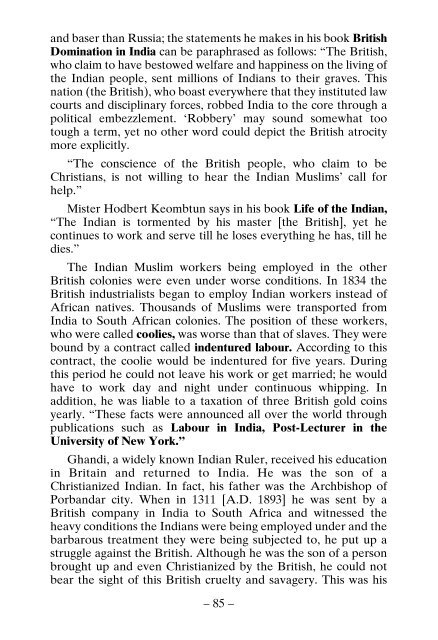Confessions Of A British Spy
Muhammad of Najd was the sort I had been looking for. For his scorn for the time’s scholars, his slighting even the (earliest) four Khalîfas, his having an independent view in understanding the Qur’ân and the Sunna were his most vulnerable points to hunt and obtain him. So different this conceited youngster was from that Ahmed Efendi who had taught me in Istanbul! That scholar, like his predecessors, was reminiscent of a mountain. No power would be able to move him. Whenever he mentioned the name of Abû Hanîfa, he would stand up, go and make an ablution. Whenever he meant to hold the book of Hadîth named he would, again, make an ablution. The Sunnîs trust this book very much. Muhammed of Najd, on the other hand, disdained Abû Hanîfa very much. He would say, “I know better than Abû Hanîfa did. In addition, according to him, half of the book of wrong.
Muhammad of Najd was the sort I had been looking for. For
his scorn for the time’s scholars, his slighting even the (earliest)
four Khalîfas, his having an independent view in understanding
the Qur’ân and the Sunna were his most vulnerable points to hunt
and obtain him. So different this conceited youngster was from
that Ahmed Efendi who had taught me in Istanbul! That scholar,
like his predecessors, was reminiscent of a mountain. No power
would be able to move him. Whenever he mentioned the name of
Abû Hanîfa, he would stand up, go and make an ablution.
Whenever he meant to hold the book of Hadîth named he would, again, make an ablution. The Sunnîs trust this book
very much.
Muhammed of Najd, on the other hand, disdained Abû Hanîfa
very much. He would say, “I know better than Abû Hanîfa did.
In addition, according to him, half of the book of wrong.
You also want an ePaper? Increase the reach of your titles
YUMPU automatically turns print PDFs into web optimized ePapers that Google loves.
and baser than Russia; the statements he makes in his book <strong>British</strong><br />
Domination in India can be paraphrased as follows: “The <strong>British</strong>,<br />
who claim to have bestowed welfare and happiness on the living of<br />
the Indian people, sent millions of Indians to their graves. This<br />
nation (the <strong>British</strong>), who boast everywhere that they instituted law<br />
courts and disciplinary forces, robbed India to the core through a<br />
political embezzlement. ‘Robbery’ may sound somewhat too<br />
tough a term, yet no other word could depict the <strong>British</strong> atrocity<br />
more explicitly.<br />
“The conscience of the <strong>British</strong> people, who claim to be<br />
Christians, is not willing to hear the Indian Muslims’ call for<br />
help.”<br />
Mister Hodbert Keombtun says in his book Life of the Indian,<br />
“The Indian is tormented by his master [the <strong>British</strong>], yet he<br />
continues to work and serve till he loses everything he has, till he<br />
dies.”<br />
The Indian Muslim workers being employed in the other<br />
<strong>British</strong> colonies were even under worse conditions. In 1834 the<br />
<strong>British</strong> industrialists began to employ Indian workers instead of<br />
African natives. Thousands of Muslims were transported from<br />
India to South African colonies. The position of these workers,<br />
who were called coolies, was worse than that of slaves. They were<br />
bound by a contract called indentured labour. According to this<br />
contract, the coolie would be indentured for five years. During<br />
this period he could not leave his work or get married; he would<br />
have to work day and night under continuous whipping. In<br />
addition, he was liable to a taxation of three <strong>British</strong> gold coins<br />
yearly. “These facts were announced all over the world through<br />
publications such as Labour in India, Post-Lecturer in the<br />
University of New York.”<br />
Ghandi, a widely known Indian Ruler, received his education<br />
in Britain and returned to India. He was the son of a<br />
Christianized Indian. In fact, his father was the Archbishop of<br />
Porbandar city. When in 1311 [A.D. 1893] he was sent by a<br />
<strong>British</strong> company in India to South Africa and witnessed the<br />
heavy conditions the Indians were being employed under and the<br />
barbarous treatment they were being subjected to, he put up a<br />
struggle against the <strong>British</strong>. Although he was the son of a person<br />
brought up and even Christianized by the <strong>British</strong>, he could not<br />
bear the sight of this <strong>British</strong> cruelty and savagery. This was his<br />
– 85 –


